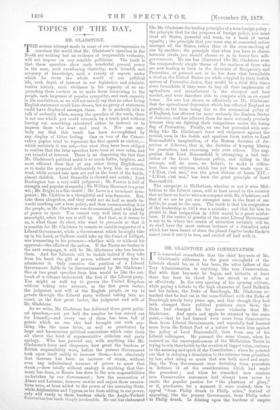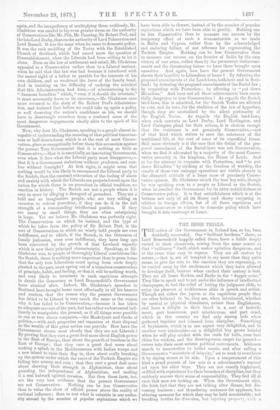MR. GLADSTONE AND CONSERVATISM.
IT is somewhat remarkable that the chief key-note of Mr.. : Gladstone's addresses to the great stronghold of the Liberals should be, as it has been, the utter failure of the Tory Administration in anything like true Conservatism. But with that key-note he began, and hitherto at least there has been no chord he has struck so often or so effectively. In the very opening of his opening address,. while paying a tribute to the high character of Lord Dalkeith and his father, the Duke of Buccleugh, Mr. Gladstone re- marked that he had sat in the same Cabinet with the Duke of Buccleugh nearly forty years ago, and that though they had" both changed their political positions since then, the
had changed his far more violently than Mr. Glade tone. And again and again he returned to the same point,—that he bad learned even more from Conservative than from Liberal Governments, and especially had learned more from Sir Robert Peel of a nature to warn him against the policy of Lord Beaconsfield, than from any of his. Liberal colleagues. He pursued the same theme, when he insisted on the unscrupulousness of the Midlothian Tories in trying to win theirbattle by the creation of faggot votes, contrary to the meaning and spirit of the Constitution ; when he pointed out that in delaying a dissolution to the extreme term permitted by law, after doing so much that was both novel and start- ling, the Tory Government were deviating from precedent in defiance of all the considerations which had made the precedent ; and when he remarked how anxious true Conservative statesmen had always been never to. excite the popular passion for "the phantom of glory," or if, perchance, for a moment it were excited, then to appeal "from Philip drunk to Philip sober," instead of appealing, like the present Government, from Philip sober to Philip drunk. In dilating upon the burdens of empire again, and the inexpediency of multiplying them recklessly, Mr. Gladstone was careful to lay even greater stress on the authority of Conservatives like Mr. Pitt, Mr. Canning, Sir Robert Peel, and the late Lord Derby, than on the authority of Lord Palmerston and Lord Russell. It was the same when he came to domestic policy. It was the rash meddling of the Tories with the Established Church of Scotland, which had raised anew the question of Disestablishment, when the Liberals had been willing to let it alone. Even on the law of settlement and entail, Mr. Gladstone appealed to a Conservative rather than to a Liberal instinct, when he said that this law was bad because it interfered with the sacred right of a father to provide for the interests of his own children, and so weakened the force of the family bond. And in insisting on the difficulty of undoing the mischief that this Administration had done,—of administering to the " damnosa hereditas " which, "even if it should die intestate," it must necessarily leave to its successor,—Mr. Gladstone once more recurred to the story of Sir Robert Peel's Administra- tion, and declared that before we could take up again a policy so well deserving the nation's confidence as his, we should have to disentangle ourselves from a confused mass of the most dangerous engagements wholly alien to the spirit of his Government, Now, why does Mr. Gladstone, speaking to a people almost in- capable of understanding the meaning of that political timorous- ness or half-heartedness which is at the root of most Conser- vatism, place so energetically before them this accusation against the present Tory Government that it is nothing so little as Conservative,—that it is essentially an innovating Government, even when it does what the Liberal party most disapproves,— that it is a Government audacious without prudence, and rest- less without foresight? At first sight, it might seem that nothing would be less likely to recommend the Liberal party to the Scotch, than the constant reiteration of the feeling of alarm and anxiety with which the Liberals see projects forced upon the nation for which there is no precedent in official tradition, no sanction in history. The Scotch are not a people whom it is easy to scare by alleging a disregard of precedent. They are a bold and an imaginative people, who are very willing on occasion to outrun precedent, if they can do it in the full
strength of a commanding intellectual position. If they are canny in small things, they are often enterprising in large. Yet we believe Mr. Gladstone was perfectly right. The Conservatism on which he insisted, and the type of which he takes from the policy of Sir Robert Peel, is the sort of Conservatism to which no wisely bold people are' ever indifferent, and to which, if the Scotch, in the bitterness of family jealousies, were ever indifferent, they have long ago been converted by the growth of that Lowland sagacity which is now their principal characteristic. Speaking, as Mr. Gladstone was, to people of thoroughly Liberal convictions like the Scotch, there is nothing more important than to press home that the only true Liberalism must spring from roots deeply planted in the past, must spring out of a tenacious conservatism of principle, habit, and feeling, or that it will be nothing worth, and very likely to terminate in such capricious attempts to dazzle the democracy as Lord Beaconsfield's Government have strained after. Indeed, Mr. Gladstone's speeches in Scotland have brought home most effectually to all his hearers and readers, that the reason why the present Government has failed to be Liberal is vary much the same as the reason why it has failed to be Conservative,—because it has taken no adequate account of the past, but has rather endeavoured bril- liantly to manipulate the present, as if all things were possible to one or two clever conjurors,—the Maskelynes and Cooks of politics,—with such properties and resources at their disposal as the wealth of this great nation can provide. How have the Government shown most clearly that they are not Liberals? By proving that they care a great deal more about English power in the East of Europe, than about the growth of freedom in the East of Europe ; that they care a great deal more about making a splash in the Mediterranean with Indian troops and a new island to raise their flag in, than about really breaking up the system under which the races of the Turkish Empire are falling into misery and ruin ' • that they care a great deal more about showing their strength in Afghanistan, than about guarding the independence of Afghanistan, and making it a real bulwark against invasion. But then these facts, too, are the very best evidence that the present Government
are not Conservative. Nothing can be less Conservative than to value the show of official power above the reality of national influence ; than to test what is valuable in our autho- rity abroad by the number of popular aspirations which we have been able to thwart, instead of by the number of popular aspirations which we have been able to gratify. Nothing can be less Conservative than to measure our success by the temporary effect of such a demonstration as we made in Malta and Cyprus, rather than by the acknowledged and enduring failure of our schemes for regenerating the Turkish Empire. Nothing can be less Conservative than to measure our success on the frontier of India by the easy victory of our arms, rather than by the permanent embarrass- ments and the threatening future we have there brought upon ourselves. And again, how have the present Government shown their hostility to Liberalism at home ? By defeating the proposed amendments of the Land-laws, both here and in Scot- land; by defeating the proposed amendments of the Burial-law ; by coquetting with Protection ; by affecting to "put down Ritualism." And have not all these achievements been essen- tially dangerous to true Conservatism ? As regards the Scotch land-laws, this is admitted, for the Scotch Tories are allowed to vote, and do vote, for the abolition of the law of hypothec, though they are neutralised by the silent pertinacity of the English Tories. As regards the English land-laws, when such converts as Lord Derby, Lord Hartington, and Lord Carington plead for their reform, it is obvious enough. that the resistance is not genuinely Conservative,—not of that kind which strives to save the substance of the traditional life, at the cost of some of its superficial forms, Still more obviously is it the case that the defeat of the pro- posed amendment of the Burial-laws was not Conservative, when we find it advocated by a majority of the most Conser- vative assembly in the kingdom, the House of Lords. And as for the attempt to coquette with Protection, and "to put down Ritualism" by striking at the freedom of worship, the results of those two unhappy operations are visible already in the alienated attitude of a large mass of genuinely Conser- vative opinion. Mr. Gladstone struck the true key note, though he was speaking even to a people as Liberal as the Scotch, when he assailed the Government for its utter unfaithfulness to Conservative policy. It is that unfaithfulness which is at the bottom not only of all its flimsy and showy conjuring in relation to foreign affairs, but of all those capricious and timid manceuvres in relation to domestic policy which have brought it into contempt at home.



































 Previous page
Previous page